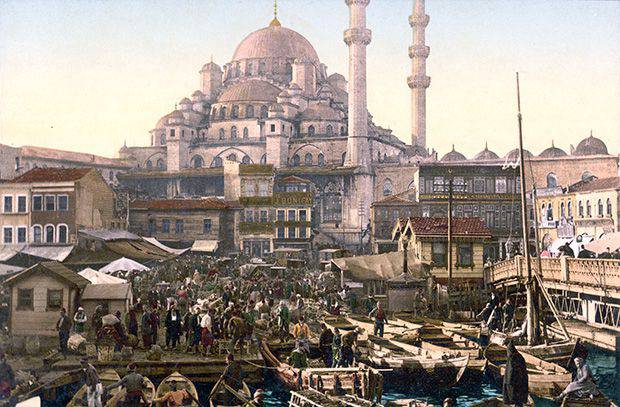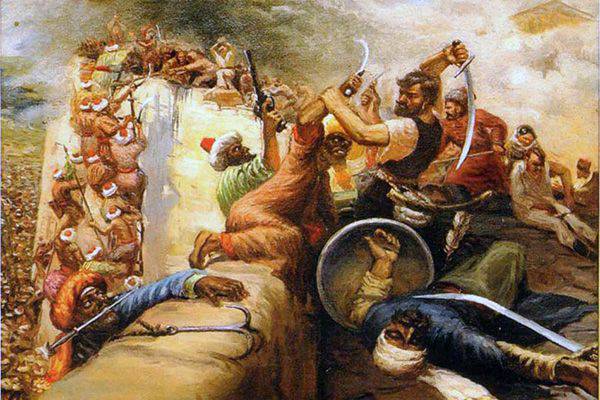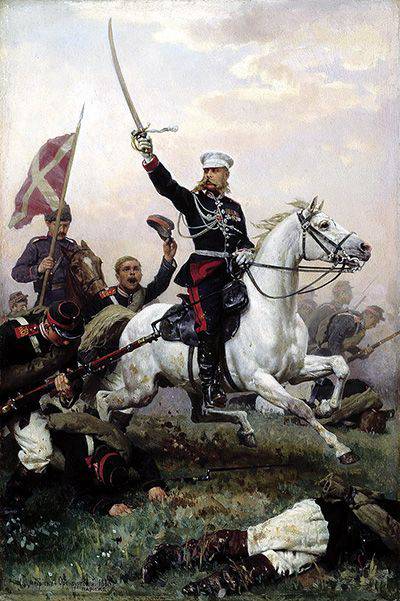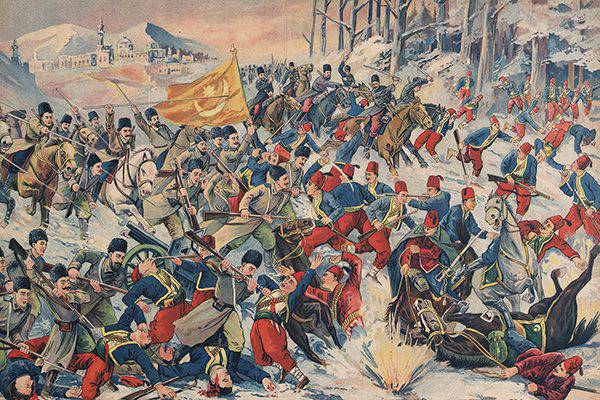Return to Constantinople: the history of the Russian-Turkish wars

For more than three centuries of military confrontation, the Ottoman armies have only once succeeded in defeating the Russian, and she defeated them eight times.
Formal story There are not so many years of Russian-Turkish relations, only a little over three centuries. The first embassy of the Russian Empire in Constantinople was opened only under Peter I, in 1701 year. And if we talk about informal ones, then we can count two centuries more: August 30 1492 of Moscow Prince Ivan III addressed the Ottoman Sultan Bayazet II with a message concerning maritime trade.
But from whatever the timing of the relations between Russia and Turkey would have to count, it will, alas, have to admit that they have never been cloudless. The two largest empires that have long existed here, at the crossroads of Europe and Asia, simply could not help but clash — and therefore could not compete. Russian-Turkish interests regularly overlapped: either on the control over the Black Sea and the Crimea, or in connection with the influence in the Balkans. And it can be said differently: religious disagreements always lay at the heart of conflicts of interests between the two countries: Istanbul was always perceived in Central Asia as one of the pillars of Islam, while Russia played the role of a major Orthodox power for all southern Slavs.
And where there is fierce rivalry in world politics, wars sooner or later arise. The first direct clash of the Russian kingdom with the Ottoman Empire occurred during the Turkish campaign against Astrakhan in 1569, and the last were battles on the Caucasian front of the First World War in 1915 – 1916. In total, as historians have calculated, during these three centuries, Russia and Turkey have been in a state of war for the 69 years, engaging in armed clashes every quarter of a century.
And that's what's interesting. Of the ten Russian-Turkish wars, only once - at the beginning of the XVIII century, during the Prut campaign of the Russian army - the Turkish state was able to prevail over the Russian troops. Three more wars actually ended in nothing: neither side could boast that they would have received any advantages over their rival. And eight times the top remained behind Russia: for the first time - in that very 1569 year, last year - in 1916.
Russian-Turkish wars of the XVI – XVII centuries
The wars of this period were distinguished from all the others by a characteristic feature: they were fought rather on the initiative of Porta, who seriously sought to limit and weaken its north-western neighbor as much as possible. It is not by chance that in all these conflicts, as one of the main military forces, the troops of the Crimean khans, who traditionally raided southern Russia and Ukraine, were used: they knew both the strengths and weaknesses of the Russian troops.
In addition, both Moscow and Constantinople almost simultaneously came to realize themselves as potential empires and began to actively move in this direction. But if at that time a considerable part of Russian interests was concentrated in the west, then for Porta the most important was the question of influence in the Black Sea lands. That is why in 1569, the 20-thousandth army of the Omani Empire moved to Astrakhan, seeking to seize the city and cut off Moscow from the northern shores of the Black Sea. But the Ottoman plans were not destined to come true: the Moscow army under the command of Prince Peter Serebryanny-Obolensky, together with the Don and Zaporozhye Cossacks, managed to lift the siege and defend the city, disperse the builders of the Volga-Don Canal and dispel the Ottoman Empire that came to the aid of the original army.
Three years later, during the famous Battle of Molodia, the troops of Ivan the Terrible struck the Crimean khan Davlet-Giray, the main ally of Porta in the northern Black Sea region, with a strong blow. Despite the fact that a year earlier he managed to burn Moscow almost completely, this time the Krymchaks suffered a major defeat, from which even 7 thousands of selected Janissaries, attached to the Ottoman allies, did not save them.
After another century, Constantinople, seriously concerned with expanding its influence in Southeastern Europe, undertook to intrigue in Rzecz Pospolita and its vassal Right-Bank Ukraine in a big way, trying with all its might to bring the Left Bank, dependent on Moscow, under control. But this attempt was eventually stopped by joint strikes of the Russian troops and the Ukrainian Cossacks. The Ottomans did not help even the fact that they managed to squeeze the enemy onto the left bank of the Dnieper: the Ottoman Empire did not make any significant acquisitions, but lost considerable human resources during several major battles.

The last major confrontation between Moscow and Constantinople in the 17th century was the Great Turkish War, which was waged with the Ottoman Empire, Austria, the Commonwealth and Russia. It was during this war that Russian troops first attempted to reach the Crimea and convert it to Russian citizenship, but did not succeed. Far better was the idea of Peter I, who had come to the power of the century on the accession of Russia on the shores of the Sea of Azov. After the first unsuccessful march on Azov, he achieved success in the second, and ultimately insisted on the conclusion of the Constantinople peace treaty, which effectively consolidated Russian dominion on the shores of the Sea of Azov.
Russian-Turkish wars of the XVIII – XIX centuries
During the next, XVIII century Russian and Ottoman empires fought four times. The first of these wars, which began in the 1710 year after the refusal of Constantinople to expel at the insistence of Peter I of the Swedish king Charles XII who fled to Porto after the unfortunate outcome of the Northern War, brought Turkey the first victory. Despite the fact that the Turkish troops could not destroy or at least disperse the Russian army, they took it in a ring, for which St. Petersburg had to pay a very high price. Under the terms of the Prut Peace Treaty, the Russian army came out of encirclement, leaving Azov in return, removing the fortifications in Taganrog and refusing to attempt to punish the Swedish king.
The revenge of Russia managed to take a quarter of a century later, when as a result of several campaigns of the Russian army, organized by the gifted commander Count Christopher Minich, for the first time managed to enter the Crimea and disperse the Crimean Tatar troops, and then inflict the first serious defeat of the Turkish army in a direct field battle. The result of the battle of Stavuchans was the confidence in their forces and their ability to win that returned to the Russian troops: the Ottoman troops left more than a thousand dead on the battlefield and fled in disarray, while the Russian losses amounted to all 13 killed!
The war, which Turkey started on its own initiative after another four decades, brought her even more troubles. During the 1768 – 1774 conflict, the Ottoman Empire lost the Crimea, declaring its independence and going under the protectorate of Russia, and suffered heavy losses, losing to the Russian troops in the battles of Kaynardzhi and Kozludzhi, as well as in naval battles of Chesme and Chios. It was at that time that the star of the greatest Russian commander, Count Alexander Suvorov, began to rise. Thanks to his military talent after another ten years, during the 1787 – 1791 war, the Russians were left with such famous victories as Victoria in the battle of Rymnik and the capture of Ishmael. This war ended with the signing of the Yassky peace treaty, which finally secured the entire Northern Black Sea region, including the Crimea, for Russia.
The first half of the next, XIX century was just as unsuccessful for Porta. Both during the 1806 – 1812 war and a decade and a half later, Constantinople failed to realize any of its geopolitical plans, and the defeats that followed one after another deprived the Ottoman Empire of all new and new lands that were withdrawing to Russia. So, the first of the wars of the last century brought us Bessarabia, the second - a significant part of the eastern coast of the Black Sea and the Danube Delta, and also allowed Russia to dramatically increase its influence in Georgia and Armenia.
And only three decades later, Turkey managed to take part in revenge, albeit at someone else’s expense. The war, which in our country is customarily called the Crimea, and in the rest of the world, the Eastern, was costly for Russia. We lost the Black Sea Fleet - along with the ability to have a military influence in this basin, as well as part of the conquests that 30 had gained years earlier. But if Russia suffered a real defeat in the Crimean War, in the East as a whole it did not: the Anglo-French attempt to seize Petropavlovsk-Kamchatsky ended in confusion, and the actions of the Russian army on the land front of the Caucasus ended with the capture of Kars fortress.
For its humiliation, which Turkey has achieved through the efforts of the British and French allies, Russia paid off in full 20 years later. The 1877 – 1878 war, didn’t prevent Russian policymakers from doing so, would end with what Empress Catherine the Great had dreamed of: taking Constantinople and setting up Orthodox crosses on the domes of St. Sophia. And although this did not happen, the blow inflicted by Russian soldiers to Turkish troops was almost fatal. And the political consequences of that war surpassed all the wildest expectations of the southern Slavs: Bulgaria, a considerable part of Serbia, Montenegro and Romania, as well as Bosnia and Herzegovina, were liberated from the Ottoman yoke. Russia, however, regained all the lands lost during the Crimean War and forever regained its military influence in the Black Sea.

The past and present century
The last direct military confrontation between Russia and Turkey was the fighting on the Caucasus front of the First World War. The Ottoman Empire, speaking on the side of Germany and Austria-Hungary, launched an offensive against Russia at the end of the 1914 of the year - and immediately suffered a catastrophic defeat in the battle of Sarykamysh. In the battle, which lasted almost a month, General Enver-Pasha's 3 Turkish army was completely destroyed. After that, the Turks could not seriously resist the actions of the Russian Imperial Army, consistently defeated in the battle of Erzrum, then under Erzindzhan, and eventually losing the city of Bitlis in the middle of 1916, which opened the way for Russian troops to Central Turkey. Another thing is that Russia, which at the same time was failing on the German front, did not develop this success, but chose to use part of the troops of the Caucasian front as urgently needed reserves.

Failures in the Caucasus and the general outcome of the First World War crippled the Ottoman Empire, and in 1922 it ceased to exist. Mustafa Atatürk came to power and was actively supported by Bolshevik Moscow, and there were no more direct military clashes between Russia and Turkey. During the Second World War, although they collaborated with Nazi Germany, they formally maintained neutrality - which, however, did not prevent them from actually helping the military fleets Axis countries on the Black Sea, while simultaneously inserting sticks into the wheels of the Soviet Black Sea Fleet. Apparently, it was on this basis that in 1945 Moscow demanded territorial concessions from Ankara: the return of the Kars region transferred in 1921, the creation of a naval base in the Dardanelles and the right of free military navigation through the straits.
Alas, eight years later, when Turkey joined NATO, the Soviet Union refused these demands. Meanwhile, Ankara itself never forgot how much land it had seized by the Ottomans had to be returned to its true masters after the battles with its northern neighbor. It was not by chance that after the collapse of the USSR, Turkish politicians, especially radical ones, spent substantial efforts and funds to support the “national liberation movement” of the Crimean Tatars, generously financing them and giving them political patronage. But if the memory of long-term losses really has the right to influence the current policy, then Moscow can quite rightly recall how it once voluntarily refused to take Constantinople and return it the status of an Orthodox city. It is possible that sometimes it is worth recalling that our opponents did not believe that only they have the right to revise the past.
Information